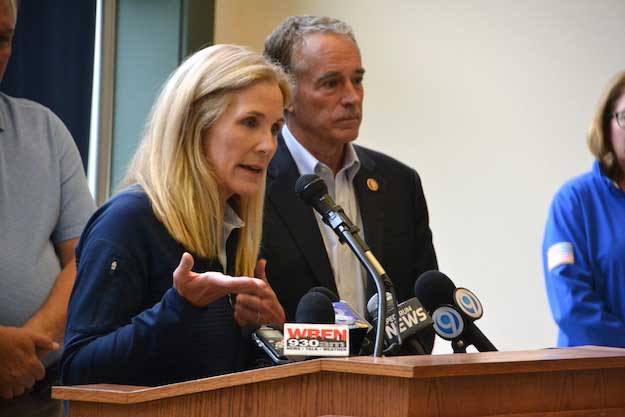IJC members say too late to react to high lake level this year
‘If it is the new normal we need to come up with a new plan because this isn’t working.’ – IJC commissioner Jane Corwin
GREECE – Four newly appointed members of the International Joint Commission, three representing the United States and one from Canada – heard from elected officials from Orleans County and other south shore communities about the impacts of flooding from Lake Ontario.
The IJC commissioners met at Greece Town Hall with officials for 90 minutes before going into Greece communities to see flooded roads, yards and homes and businesses fending off water with sandbags and pumps.
The IJC is tasked with regulating water levels. The commission has used a new plan for regulating the water levels the past three years, the first change in more than a half century.
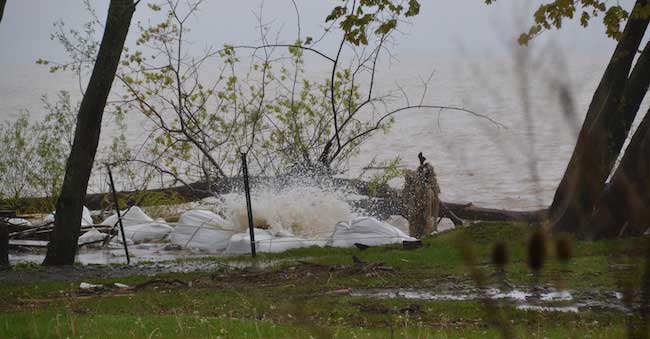
A property owner has sandbags inside large grain bags along the shore in Kendall by Monroe-Orleans Countyline Road.
Two of the three years – 2017 and now 2019 – have seen major flooding along the lakeshore.
“I would just ask for patience,” said new IJC commissioner Jane Corwin, who is the U.S. section chair. “I know that isn’t easy for people evacuating their homes and losing their businesses.”
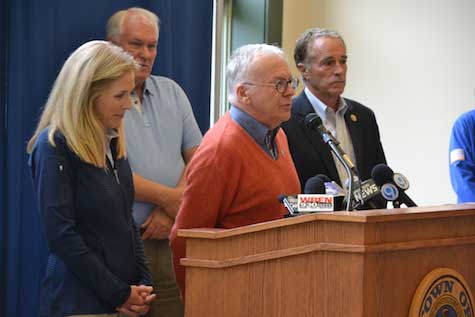
Pierre Béland, the IJC’s Canadian section chair, said Mother Nature is most at fault for the high lake levels, not a plan for regulating the lake.
She and the new commissioners just started the job less than two weeks ago. They want to see how much of the flooding is attributable to Plan 2014 and how much is from melting snow and rainfall.
Pierre Béland, the IJC’s Canadian section chair, said the high lake levels are due to rain and the high water levels in the other Great Lakes.
“These is no plan that would have relieved better than 2014,” Béland told reporters at Greece Town Hall. “There is no way to get more water out of the system without flooding other people.”
But there have been other wet springs and winters with lots of snow. The lake levels only were this high in 2017 and now this year. That has community leaders pointing to the Plan 2014 as a culprit.
Béland said the precipitation is the main cause.
“It’s unique,” he said about the rainfall. “it’s unseen. It hasn’t happened before.”
Corwin said water was let out in the fall at the maximum levels allowed by Plan 2014. But, State Sen. Robert Ortt said the old plan would have let out even more water in the fall, before it’s too late in the spring to respond without flooding the Canadians.
Congressman Chris Collins, R-Clarence, said he supports scrapping Plan 2014 and going back to the plan from the 1950s which resulted in only one flooding event, in the mid 1970s.
“We can’t continue down this road,” Collins said.
He attended the closed door session with officials from the six counties.
“Their testimony confirmed what a catastrophe we’ve been dealing with,” Collins said.
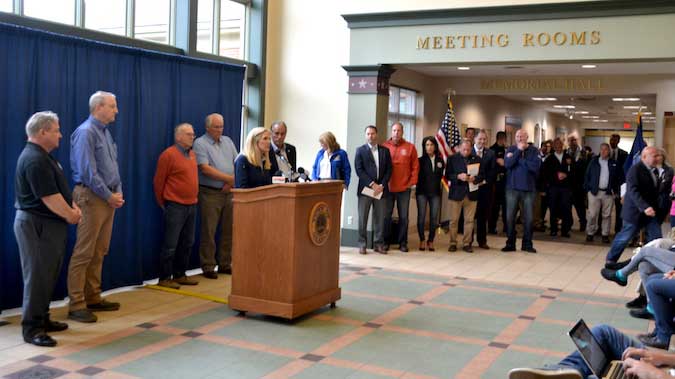
Jane Corwin and other local officials and IJC members meet with reporters after a closed-door session at the Greece Town Hall to discuss the impact of the high waters.
In Orleans County, no roads have been closed yet due to flooding. Several roads have been closed in Hamlin and Greece in neighboring Monroe County.
Lynne Johnson, Orleans County Legislature chairwoman, attended the session today with the IJC commissioners. She said the IJC’s new representatives will work to have a better plan in place long-term. Unfortunately, that won’t help with this year’s flooding, Johnson said.
“We want more of a quick fix,” she said.
Johnson is thankful Corwin, a former state Assemblywoman from Clarence, is on the IJC. Her Assembly district included parts of Orleans, Niagara and Erie counties.
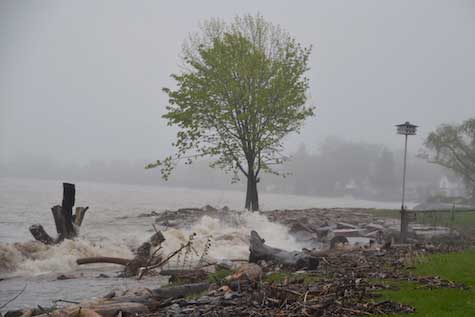
The shoreline at Oak Orchard Harbor by the lighthouse takes a beating today from the waves.
“She knows our area,” Johnson said. “She knows our lake. She has sailed our lake.”
The three lakeshore towns in Orleans – Carlton, Kendall and Yates – have all declared a state of emergency due to the high lake levels. The towns have worked with residents to put sandbags by the shoreline.
Inmates and the National Guard have helped to fill and stack sandbags. The state also has brought in AquaDams, which are large tubes filled with water.
Corwin said she is impressed by the collaboration among the local governments, and the state and federal agencies.
The IJC commissioners will find answers for the cause of the flooding, to see if it’s mainly from precipitation that can’t be handled or if Plan 2014 is at fault, too, Corwin said.
“Is this the new normal or is it an extended flooding level like 2017?” she said. “If it is the new normal we need to come up with a new plan because this isn’t working.”
In the meantime, Assemblyman Michael Norris, R-Lockport, said the lakeshore communities are suffering economically, as well as from the flooding. He reminded the community that many businesses are still open and would welcome support from their customers.






























